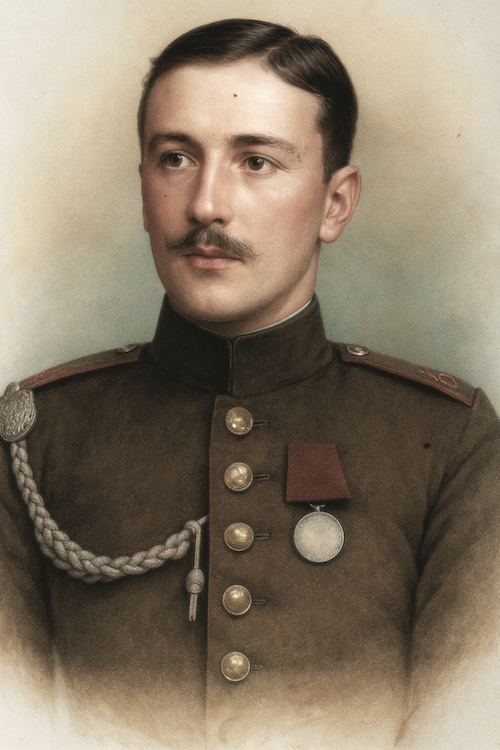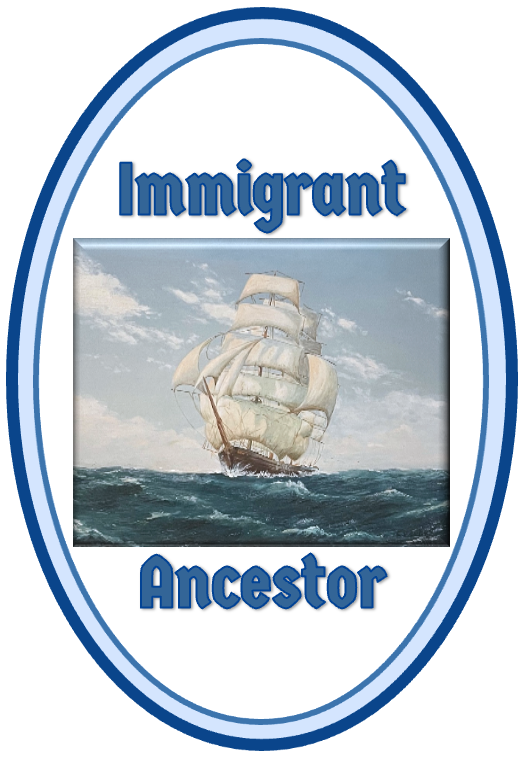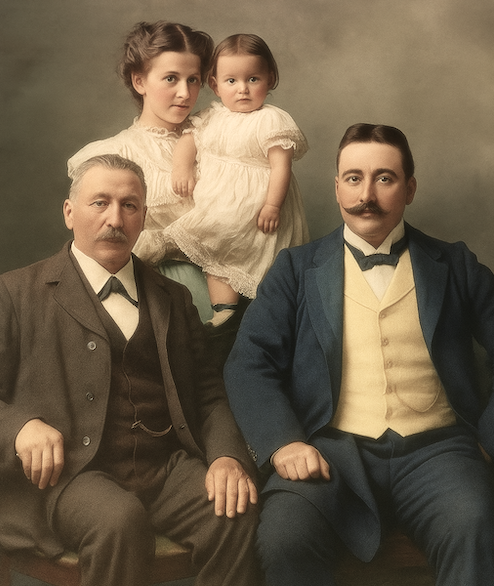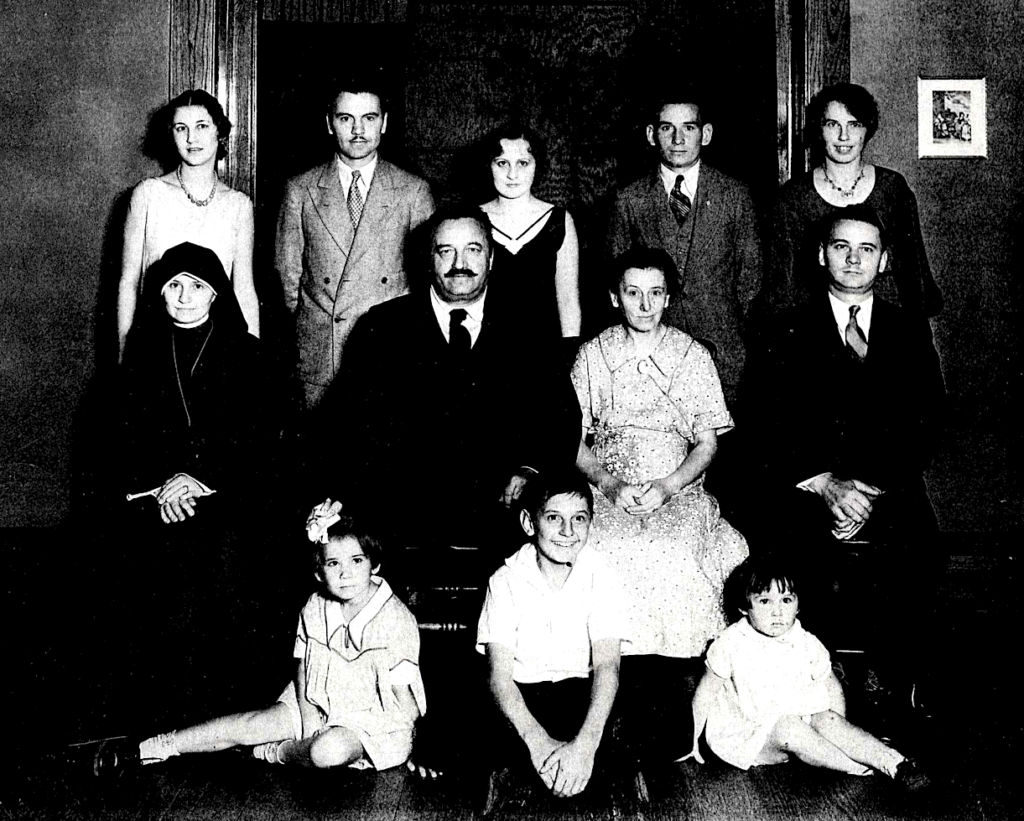
Military duty was compulsory in
England at this time.
This is enhance with ChatGPT –
– Click for original –
– Open Image in new tab to enlarge –

James Riehle took a circuitous route to his new home in America. Born in Nordrach* Baden in 1877 (just to the southeast of Offenburg), he had moved to London England by the turn of the century. Soon after he met Frances Mary Hulme (1882-1952) whom he married in 1902. The couple had two sons and a daughter in England but with two of Frances’s brothers working in Canada, James followed to explore opportunities and by 1910 and the birth of their second daughter, the family had resettled there.

with James’ father, Johann Riehle. c.1904.
They lived well North of Prince Albert, in a deeply isolated area of Saskatchewan.
Family lore suggests James worked as forester. By the middle of the decade however, James’ sympathies for the Kaiser began to grate on the deeply patriotic Canadians, embroiled in a horrific war with mounting causalities on both sides. In 1916 James was banned from Canada, traveling now with three sons and three daughters by train to Winnipeg and then on to Minnesota, arriving in Saint Paul in April of that year.
Presumably loyalty to the Kaiser was held in check as the US entered WWI, no doubt with the encouragement of his British wife. James’ WWI draft card shows him as born in Germany but as a naturalized British subject who had lived in Canada. Per census records, he did not serve in the war, but by 1920 he had filed for US citizenship.
By 1930 James and Frances had seven surviving children, having lost one in a tragic car accident in 1921. They owned their own home worth approximately $2200 but did not yet own a radio set. James was employed through this period as a bookkeeper.
By 1940 James was no longer employed and he passed away on February 17, 1943, with Frances living on until March 30, 1952. Both remained in St Paul until their deaths.
Riehle Lineage Ancestry of James Riehle
(WikiTree ID: Riehle-165)
Mathias Riehle 1681-
Michael Riehle 1719-
Georg Riehle 1753-1839
Valentine Riehle 1789-1869
Johann Evangelist Riehle 1824-1864
Johann Riehle 1845-1910
James Riehle 1877-1943
* All of the above were born in Nordrach. We have Y-DNA details which tightly link the above lineage to The Riehle Family of Wagshurst Baden, with the most recent common male ancestor connecting the two lineages as having lived in the 16th or or early 17th century, with the highest likelihood in the generation born around 1600. Nordrach is about a 31 km hike south from Wagshurst though the 50 km drive would be much faster in our current century. From Offenburg, Nordrach is just a 17 km hike or 30 km drive, renewing our interest in finding Y-DNA links with the Riehle lineage in Offenburg.
We speculate (see article) that one line or the other (likely the Wagshurst line) resettled during or soon after the Thirty Years War. While unverified, that speculation is consistent with the timing of the origination of their shared Y-DNA subclade and is certainly consistent with the sweeping impact of the war, including an estimated 30 to 40% population decline in Germany (Holy Roman Empire) and the displacement of millions more.
Link: Seeing Double – Two Riehle PhDs Research Mosquitoes and Related Diseases
(Dr. Michelle Riehle PhD is the great-granddaughter of James Riehle)
Our thanks to John Frederick Riehle, son of Frederick William Riehle, son of James Riehle of Nordrach, Baden who provided most of the information used for this article, with additional sources accessed through Ancestry.com.
Share this page with family on
social media

I have a photo and calling card of a William James Riehlé. He painted a portrait of my mother, either in Philadelphia or on Martha’s Vineyard. 1928-1930 ish. Known as Willy.
My mom’s oldest sister married a man from twin cities Minn area.
Thanks for your note. We do not have a record of a William James Riehlé in the family of James Riehle of Nordrach, Baden and St Paul. In fact the only Riehlé family (i.e., with the accent) I have come across is that of Frederick A. Riehlé & brother Henry Riehlé of Riehle Brothers Machine Co. (see Menu section: “Riehle’s of Renown”). They lived mostly in Philadelphia so that might be the family of this painter, or not. Henry had a son, Otto Riehle (or Riehlé) who was born some years after the Civil War but we have no other… Read more »